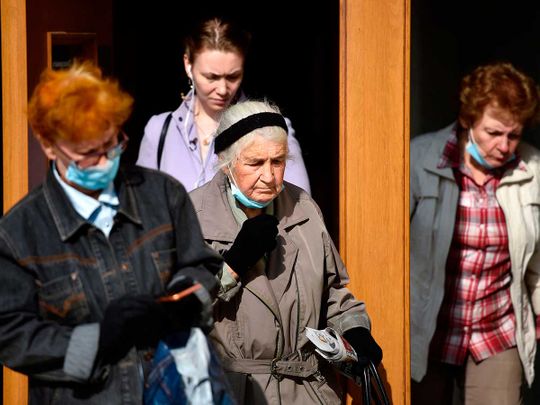
Moscow: Moscow Mayor Sergei Sobyanin on Friday ordered older people to stay at home and recommended employers ramp up remote working, after a spike in virus infections.
The caseload had remained steady for several months but climbed steeply in recent days in Russia, the world’s fourth most affected country, back towards the levels seen in June.
The mayor highlighted a “serious” increase in hospital admissions and said the over-65s and those with chronic illnesses should stay at home from Monday and shop rarely, although walks outside would remain unrestricted. “Unfortunately we see a significant increase in the number of confirmed cases in Moscow in recent days,” Sobyanin said in his blog. “So from September 28, we are asking you to stay at home.”
Coronavirus cases in Moscow on Friday reached 1,560 - the highest level since June 12 - and nearly 800 people have been taken to hospital in the past 24 hours. Russia has confirmed 1.14 million coronavirus cases and 20,056 deaths. On Friday, it announced 7,212 new cases, the highest number since June 23. Beyond the capital, the highest number of new cases are in the region surrounding Moscow and in the second largest city of Saint Petersburg.
President Vladimir Putin on Thursday acknowledged that virus cases were increasing in many regions in comments to new governors. While saying Russia’s “situation is a bit better” than that of other countries, he warned that “if we relax, the situation could change drastically”. “You mustn’t let these problems drift into the background, otherwise they will blaze up again with new force,” he said.
The Moscow mayor’s decree presents the stay-at-home measure as a compulsory rule, with exceptions for medical care, shopping, walking dogs and commuting to work.
At the beginning of the virus lockdown in late March, Sobyanin brought in some of the country’s strictest measures including cancelling free travel passes for older people to discourage unnecessary trips.
‘Not conquered yet’
Sobyanin said those in high-risk groups should work from home or claim vacation or sick leave if possible. He warned that simultaneously catching the common cold and the virus as winter approaches was particularly dangerous for older people and those with chronic illnesses. He also told employers: “I firmly ask and recommend you to move as many of your staff as possible to home-working.” Employers should offer virus testing and temperature checks, he said.
Warning the virus was “not conquered yet”, he called for Moscow residents to wear face masks and gloves on public transport and in shops, a rule already in place but widely flouted. Officials in the capital have recently ordered several supermarkets to close for failing to enforce the rules. On Friday, an official said the city had fined a luxury department store, TsUM, more than 1 million rubles ($13,000). At the peak of lockdown in May, Sobyanin ruled that residents could only venture out to their nearest shop or to walk a dog, while those using public transport or cars needed electronic passes.
“We all really don’t want to go back to the harsh restrictions of spring,” the mayor said. “I hope we can avoid this.” Russia has boasted of creating the world’s first approved coronavirus vaccine, Sputnik V, although it is still undergoing clinical trials. Putin praised the vaccine as safe and effective during a speech to the United Nations on Tuesday and offered to inoculate UN staff for free.
A number of high-profile officials and politicians have already taken the vaccine, including Sobyanin and Defence Minister Sergei Shoigu. Putin has said one of his daughters was vaccinated.








